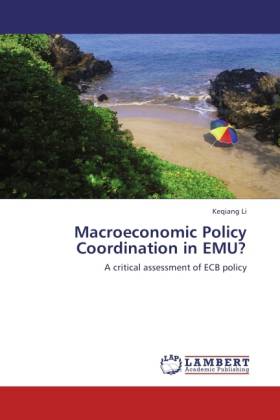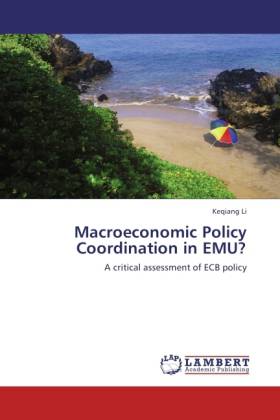
- Afhalen na 1 uur in een winkel met voorraad
- Gratis thuislevering in België vanaf € 30
- Ruim aanbod met 7 miljoen producten
- Afhalen na 1 uur in een winkel met voorraad
- Gratis thuislevering in België vanaf € 30
- Ruim aanbod met 7 miljoen producten
Zoeken
Macroeconomic Policy Coordination in Emu?
A critical assessment of ECB policy
Keqiang Li
Paperback | Engels
€ 48,45
+ 96 punten
Omschrijving
The European debt crisis has become much more serious recently and spread from small economy, e.g. Greece to larger economy, e.g. Spain, Italy. A major reason for this problem is the unique characteristic of fiscal policy and monetary policy within the euro zone. The national fiscal policies are decided by every member state, and may be different from each other, while the single united monetary policy is made by the ECB. As a result, the macroeconomic coordination problem is likely to emerge. This paper investigates the interactions between monetary and fiscal policies within a monetary union and assesses the ECB's policy in promoting the macroeconomic coordination. Two types of macroeconomic coordination failure may emerge in the context of the monetary union. Since the coordination failure can bring large inefficient loss to the economy at the union level, the macroeconomic coordination is absolutely necessary.
Specificaties
Betrokkenen
- Auteur(s):
- Uitgeverij:
Inhoud
- Aantal bladzijden:
- 56
- Taal:
- Engels
Eigenschappen
- Productcode (EAN):
- 9783847310563
- Verschijningsdatum:
- 29/12/2011
- Uitvoering:
- Paperback
- Formaat:
- Trade paperback (VS)
- Afmetingen:
- 152 mm x 229 mm
- Gewicht:
- 95 g

Alleen bij Standaard Boekhandel
+ 96 punten op je klantenkaart van Standaard Boekhandel
Beoordelingen
We publiceren alleen reviews die voldoen aan de voorwaarden voor reviews. Bekijk onze voorwaarden voor reviews.











